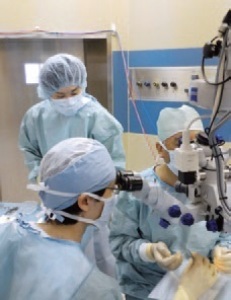Centers & Services
Top > Centers & Services > Clinical Services > Ophthalmology
Ophthalmology

The Department of Ophthalmology specializes in an extensive range of ocular diseases such as cataracts, glaucoma, vitreoretinal disease, corneal disease, uveitis, neuroophthalmologic disease, strabismus, amblyopia, and eyelid.
Medical services
The outpatient clinic provides care in specialized therapeutic areas including glaucoma, macula, retinal detachment, diabetic retinopathy, hereditary retinal disorder, keratoconjunctiva, uvea, neuroophthalmology, strabismus/amblyopia, retinopathy of prematurity, eyelid and low vision. Patients with cataracts are also treated by specialists in those areas.
Diagnosis and treatment policy
Treatment plans for inpatients are discussed and determined at weekly ward conferences in which all assistant professors in charge of the ward participate and during rounds headed by a professor and an associate professor. Treatment plans for outpatients are determined based on discussion by specialists in the outpatient clinic.
Specialties
Cornea
In addition to corneal transplant, surgery using the patient’s own corneal cells and oral mucosal cells can also be performed to treat severe eye surface problems such as alkali burn.
Glaucoma
The department develops advanced drug therapy for normal tension glaucoma, and selects surgical options according to each patient’s condition. Treatment for refractory glaucoma has been given to many patients.
Macula
The most advanced drug therapy, laser treatment such as photodynamic therapy, and surgical therapy are frequently performed to treat macular disease such as age-related macular degeneration.
Diabetes
Laser therapy, surgery and other procedures are performed depending on the condition of the disease.
Retinal detachment
The optimal surgical procedure is selected according to the condition of the disease. Surgery for special cases accompanying trauma and atopic dermatitis is also available.
Strabismus
Based on the symptoms of the patients, prism corrections, surgical.
Uvea
We perform a PCR test and make appropriate diagnosis and treatment.
Target diseases
Cataract, glaucoma, retinal detachment, age-related macular degeneration, epimacular membrane, macular hole, retinal vein occlusion, keratoconjunctival disorder, diabetic retinopathy, retinitis pigmentosa, uveitis, optic nerve disease, ophthalmoplegia, strabismus, amblyopia, ptosis
Advanced treatments/ Specialized treatments
Rapid diagnosis (PCR) for refractory eye infections (virus, bacteria, fungi)
Frequently performed tests
- Visual acuity test/ fundus test
- Slit-lamp microscopy: Examination of cornea and cataract
- Detailed funduscopy: Examination of disorders at the back of an eye
- Perimetry: Visual field examination
- Three-dimensional image analysis (anterior and fundus)
- Fluorescein fundus angiography: Detection of vascular abnormalities at the back of an eye using a contrast agent
Makoto Aihara
Departments/Divisions
Ophthalmology, Department of Corneal Transplantation
Titles
M.D., Ph.D
Expertise/Specialties
Glaucoma, Neurobiochemistry, Ocular Pharmacology
Research Interests
・the analysis of the risk factor activating glaucoma
・the study of the surgical outcomes of glaucoma
・the elucidation to the pathology of increasing intraocular pressure through bioactive lipids
・the development of new drops for glaucoma
Languages
Japanese, English
Numbers of in- and outpatients treated in this department
| Inpatients: | Outpatients: |
|---|
| Total: 2,058 | Daily mean:2,684 |
| Daily mean: 36.7 | Monthly mean (new patients) : 50,216 |
| Daily mean: 206.7 |
| Imcoming referral rate: 96.4% |
| Outgoing referral rate:120.1% |
(2015)
Numbers of major operations and treatments performed
| Name of inpatient surgery | Number |
|---|
| 1 | Cataract surgery | 1,212 |
| 2 | Vitreoretinal surgery | 403 |
| 3 | Glaucoma surgery | 325 |
| 4 | Corneal transplant | 104 |
| 5 | Lacrimal surgery | 107 |
(2015)

